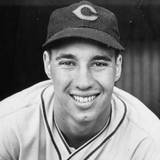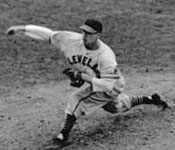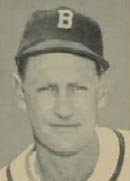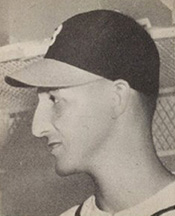|
CONTENTS
Bob
Feller
Stan
Musial
Tony
Lazzeri
Jack
Chesbro
Gil
Hodges
Hack
Wilson
Ty Cobb
Eddie Mathews
Willie Mays
Greats Bad Days - II
Greats Bad Days - III
Baseball
Page
Golden
Rankings Home
Top
of Page
|
Even
the Greats Have Bad Days – I
This feature discusses a game or series in which an outstanding player did not perform
well.
World Series, Game 5 – Cleveland Municipal Stadium, Sunday, October 10, 1948
|
Bob
Feller takes the mound for the Indians before an all-time record crowd of 86,288 (including over 11,000
standees) to try to close out the Boston
Braves.
- Cleveland has taken
three in a row since a heartbreaking Game One loss at Braves
Field.
- That day, Feller picked Phil Masi off second in the eighth inning only to have umpire Bill
Stewart call the runner safe. Tommy Holmes then singled Masi home with the only run of
the contest.
Feller had a so-so year in 1948 by his standards.
- His record was a poor 9-15 with a 3.56
ERA.
- He struck out only 164, a far cry from the record 348
he had fanned in 1946.
- Bob
Lemon and Gene Bearden both
won 20 to top the Tribe staff. The Braves starter is RH Nelson Potter, who went 5-2
after the A's released him in June. Comparing the credentials of the two
starters, the home throng has every right to expect a celebration.
However, baseball is the most unpredictable of games.
Boston jumps on Rapid Robert in the first as 3B Bob Elliott swats a three-run homer.
- However,
the hometown heroes rally for 4 in the bottom of the fourth,
driving Potter to the showers to take a 5-4
lead. The big blow is a three-run shot by C Jim Hegan.
- Billy Southworth, managing as if there's
no tomorrow, brings on his ace lefthander Warren Spahn who cools the Indian bats, allowing only
one hit and no runs the rest of the way.
The
visitors tie the contest on a HR by Bill Salkeld in the sixth. Then the roof caves in on the Indians in the seventh.
- Holmes singles and is bunted
to second. 1B Earl Torgeson singles in Holmes,
knocking out Feller in favor of Ed
Kleiman.
- He doesn't douse the fire, surrendering two
singles and a walk.
- Manager/SS Lou
Boudreau summons Russ Christopher,
but he is touched for two more bingles.
- Finally, Satchel
Paige (42+ years old) gets Spahn to hit a SF (although he is charged with an at-bat according
to the rules of the day) to end a string of six straight reaching
base. Holmes grounds out to end the nightmare.
- Boston sends the Series back to Beantown, 11-5. (Lemon pitches the clincher the next day with a save from Bearden,
4-3.)
Feller's
line for Game 5:
6 1/3 innings, 8 hits, 7 runs (all earned),
2 walks, 5 strikeouts.
He never pitches in another World Series
game and ends his Hall of Fame career with no post-season victories.
|
World
Series, Game 1– Sportsman's
Park, St. Louis, Wednesday, September 30,
1942
21-year-old Stan
Musial plays in his first World Series game before
34,769 in his home park. In his first full NL season, he hit
.315 with 72 RBI in 140 games for a Cardinal team that had to win 106 games to edge the defending league
champion Dodgers by two games. St. Louis led the league in hitting, pitching, and fielding. (In case
you're wondering if Stan won NL Rookie of the
Year, that award was not inaugurated until 1947.)
Batting
cleanup and playing LF, Stan flies out twice
as the Yankees' Red
Ruffing no-hits the Redbirds for 7 2/3. After Terry Moore singles, Ruffing retires Enos Slaughter and returns to the mound
in the bottom of the ninth with a 7-0 lead. Musial leads off by fouling out. C Walker Cooper singles,
but 1B Johnny Hopp flies out. Needing only
one more out, Ruffing can't get it. He walks
PH Ray Sanders and surrenders a two-run triple
to SS Marty Marion. PH Ken O'Dea's
single drives in Marion. 2B Jimmy Brown singles to knock out Ruffing in favor of Spud
Chandler. However, Moore singles home
the fourth run. Then Slaughter's infield single
loads the sacks and brings Musial to the plate
for the second time in the inning. With the tying runs on base,
he grounds back to Chandler to end the game.
Even
though the rally fell short, it gives the Cardinals confidence
going into Game Two. The momentum from the ninth inning propels
them to four straight wins to shock the Yankees and take their first World Series since the Gashouse Gang of
1934.
Stan went 4-18 (.222) in his first Fall Classic with 2 RBI and a
double. He played in three more in the next four years, hitting
.278 against New York in 1943 (when he was NL MVP), .304 vs. the Browns in '44, and .222 against the Red
Sox in 1946 (when he was again NL MVP as well
as ML Player of the Year). He never appeared in the post-season
again in his Hall of Fame career, retiring at the end of the
1963 season just before St.
Louis defeated the Yankees in the '64 World Series.
In
one of those wonderful statistical anomalies that only baseball
provides, Stan garnered 3,630 hits in his glorious
career: 1,815 on the road and 1,815 at home.
|
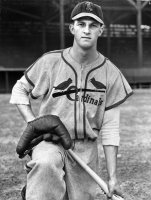 Stan Musial 1941
Stan Musial 1941
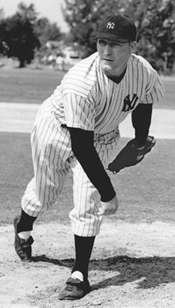
Red Ruffing
|
|
World Series, Game 7– Yankee Stadium, Sunday, October 10, 1926
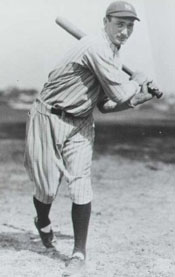 Tony Lazzeri
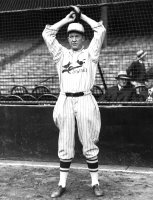
Grover Cleveland Alexander
|
22-year-old 2B Tony Lazzeri has culminated an outstanding rookie
season (.275, 114 RBI, 18 HR) by appearing in the World Series
against the St. Louis Cardinals.
- After hitting only .227 (5-22) in the first six games, Tony hopes to contribute to a Yankee win in the decisive finale.
- However, he strikes out and flies
out twice against Jesse Haines.
Then comes one of the most famous at-bats in baseball history.
- The Yankees load the bases in the 7th on a single by Earle Combs,
a sacrifice by Mark Koenig, an intentional
walk to Babe Ruth, and – after Bob
Meusel grounds out – a walk to Lou Gehrig.
- At that point, player-manager Rogers Hornsby calls on Grover
Cleveland Alexander, who had kept the Cards alive the day before with a complete game 10-2 victory.
- 39-year
old Alexander strikes out Lazzeri to end the threat.
- Then "Old Pete"
retires five in a row before walking Babe Ruth with two out in the ninth.
- With Meusel up (not Gehrig as is stated in some recounts of the
game), Ruth inexplicably tries to steal only
to be cut down by C Bob O'Farrell. It remains
the only time a World Series has ended on an attempted steal.
- Denied another AB, Lazzeri finishes the Series
a woeful 5-26 (.192). It was the worst of his six Fall Classics
for New York. The best was his last, 1937, when he hit .400.
Contrary
to the mythology surrounding this game, Alexander was not hungover when the trudged in from the bullpen
to face Lazzeri.
- After Game 6, Hornsby had told him he might need him the next day.
- Alex swore to his dying day that he did not party the night before.
Lazzeri played 12 years with the Yankees before closing his career with the Cubs in 1938 and the Dodgers and Giants in
1939. His lifetime BA of .292 with 1,191 RBI and 178 HRs earned
him election to the Hall of Fame in 1991 by the Veterans Committee.
|
Friday,
October 7, 1904 – Monday, October 10, 1904
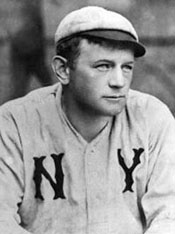
Jack Chesbro
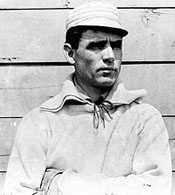
Clark Griffith
|
The New York Highlanders,
in their second year in New York after moving from Baltimore,
trailed the Boston Red Sox by one-half game entering a five-game series to end the season.
The first game was scheduled for New York at Hilltop Park
on Friday. Then the teams would travel to Boston for a Saturday
doubleheader. After the mandatory day off on Sunday because
of "blue laws," the season would end with another
DH in New York on Monday.
On
Friday, the Highlanders'
ace righty Jack
Chesbro, pitching on two days rest, beat the Bosox 3-2 for
his 41st win to put New
York a half-game up. NY Manager Clark Griffith planned to hold Jack until Monday's DH but let Chesbro talk him
into starting him in the first game in Boston. That was a
mistake as Jack was knocked out of the box
for only the third time all season in a 13-2 rout. When Cy
Young twirled a 1-0 shutout in the nightcap, Boston had a 1.5 game lead. The Highlanders had to sweep the Monday DH to capture the AL flag.
Making
his eighth start in 15 days, Chesbro led
2-0 after six in the first game of the twinbill. However, Boston scored twice in the seventh with the help of two errors by
2B Jimmy Williams to tie. The game stayed
2-2 into the ninth. Lou Criger led off for
the visitors with a single and advanced to third with two outs. Chesbro,
who threw almost nothing but spitballs, then uncorked a wild
pitch that sailed over the glove of C Red Kleinow and ricocheted off the press box. Criger scored the go-ahead run. Freddy Parent singled
on the next pitch, but no one will ever know what would have
happened without the wild pitch. The Highlanders were retired in the bottom of the ninth to clinch the second
straight pennant for the Beantowners. New
York then won the anti-climactic second game 1-0 to finish 1.5
games behind with a 92-59 record.
Chesbro unfortunately would be remembered as the man who lost the
pennant on a wild pitch. He never came close to 41 wins again
(nor his 1.82 ERA of 1904). The most he won in the remaining
four full seasons of his career was 23 in 1906. Some say he
never recovered psychologically from the wild pitch. However,
a more realistic evaluation points to the strain on his arm
from pitching 48 complete games in 1904. He never threw more
than 24 CGs in his remaining four full seasons.
Jack won 198 games with a lifetime ERA of 2.68. He was elected to
the Hall of Fame in 1946 by the Old-Timers Committee.
|
|
|
1952 World Series: Brooklyn Dodgers vs New York Yankees
In one of the greatest Fall Classics ever, with nine future
Hall of Famers in the dugouts, the Yankees defeated the Dodgers in seven games. This marked the fourth heartbreak in 11
years for Brooklyn at the hands of the Bronx Bombers
(1941, 1947, and 1949 being the previous three Series victories).
The Dodger "goat"
was 1B Gil Hodges who went hitless in
21 at-bats in the seven games. Six times he went down
on strikes. He did walk five times and actually had an
RBI on a flyout in game 7. However, he was not credited
with a sacrifice fly according to the scoring rules in
place from 1940-1953.
Gil's
worst game was the sixth at Ebbets Field when the Dodgers held a three-games-to-two edge.
- Hitting in the seventh
slot, Hodges struck out three times against
RHP Vic Raschi.
- Trailing 3-2, manager Charlie Dressen sent left-handed hitting
Rocky Nelson to bat for Gil
to lead off the ninth against Allie Reynolds.
Rocky also struck out.
Gil's
season-long stats in no way prepared the fans for what happened
in the Series.
- In 153 games in 1952, his fifth full season
with the Bums Gil hit .254 with 107 walks.
- He hammered
32 HRs and drove in 102. His OBP + SLG was .886.
Hodges was the Dodgers' Lou Gehrig, strong but sphinxlike.
- The gentle giant was known as a quiet, kindly man with a dry sense of humor.
- Yet coming into the '52 Series, Gil was not a beloved Dodger. Respected, yes. Beloved, no. Pee Wee Reese, Duke Snider, Jackie Robinson, and Roy Campanella all outranked Hodges in the Brooklyn pantheon.
- Ironically, it was his 0-for-21 agony that made the big first-sacker one of the fans' favorite Dodger.
- Catholic priests at Masses all over the area implored their congregations, including Gil's own parish, to pray for an end to the slump. Nuns told their students to add Hodges to their daily prayer intentions.
When Gil started slowly the following spring,
hitting only .187 in mid-May, fans sent letters and good-luck gifts.
- Father Herbert
Redmond told his Brooklyn congregation one Sunday:
"It's far too hot for a homily. Keep the Commandments
and say a prayer for Gil Hodges."
- More than 30 people a day wrote Hodges. Fans sent him rabbits' feet, rosary beads, mezuzahs, and scapulars. One man sent him a container of carrot juice to improve his batting eye.
- Gil's good friend and fellow Indianan Carl Erskine recalled: Gil was distraught during his slump, but he didn't talk about it. He never talked about it. He would come out early and try things, and guys would give him advice - you get tons of advice when things are going bad - and Dressen had him out early, working on hitting to the opposite field. But it was not something talked about on the bench.
- Charlie finally figured out what was wrong. After looking at hundreds of photos of Hodges batting, he determined that the problem was stepping into the bucket, which threw his timing off. So Charlie said, Keep your front foot where it is, but move the back foot father from the plate. Now when you step back, you'll be stepping into line.
- Hodges began hitting again soon afterward, finishing the '53 season at .302, and led all Dodgers in the '53 Series with .364. He didn't bat less than .292 in any of his remaining four
Fall Classics.
|
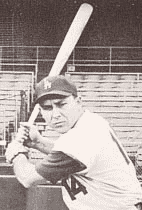
Gil Hodges
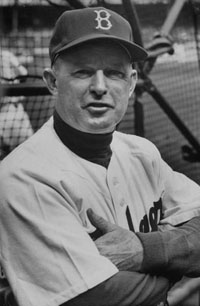
Charlie Dressen
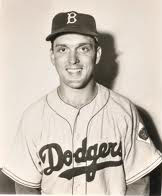
Carl Erskine
|
Reference: Bums: An Oral History of the Brooklyn Dodgers, Pete Golenbock (1984)
1929 World Series, Game 4: Chicago Cubs @ Philadelphia Athletics
- The A's led Chicago two games to one, with the visiting team winning all three
games.
- The Cubs were on their way to tying the series with an 8-0 lead going
into the bottom of the seventh at Shibe Park. Charlie
Root was coasting with a three hitter.
- 66-year-old Connie Mack, A's manager, told several regulars to go to the clubhouse after the inning to give his benchwarmers a chance to play in the World Series.
Then the roof
fell in on the Cubs, aided by two misplays in centerfield.
- LF Al Simmons homered onto the left-field roof. At least, Philly wouldn't be shut out.
- 1B Jimmy Foxx singled to right.
- RF Bing Miller flied to center but Hack
Wilson lost the ball in the sun. Miller
was credited with a single to put runners at first and
second.
- 3B Jimmy Dykes singled to left, scoring
Foxx with Miller stopping
at second.
- SS Joe Boley singled to right, Miller
scoring and Dykes to third.
- George Burns, pinch-hitting for P Eddie Rommel,
popped to short.
- 2B Max Bishop singled over Root's
head, Dykes scoring and Boley going to third. With
the score 8-4, Cub manager Joe McCarthy brought in lefty Art Nehf, a veteran of four World Series with the Giants.
- CF Mule Haas hit a long fly ball to center,
but Wilson again lost the ball in the
sun. This time Haas circled the bases
for a three-run homer to pull the A's within one run.
In the Philadelphia dugout, 3B Jimmy Dykes slapped the man next to him on the back and shouted, "We're back in the game, boys!"
Imagine Jimmy's chagrin when he realized he just knocked his manager off the bench.
"I'm sorry," said Jimmy, pulling Mack to his feet.
"That's all right, Jimmy," said Connie. "Everything's all right. Anything you do right now is all right. Wasn't it wonderful?"
- C Mickey Cochrane walked. McCarthy
replaced Neff with Sheriff Blake.
- Simmons bounced a grounder that took a bad hop over 3B Norm McMillan's
head for a one-bagger, Cochrane stopping at second.
- Foxx singled, scoring Cochrane with the tying
run. McCarthy made his third pitching change of the inning, calling
on Pat Malone.
- Miller was hit by a pitch, loading the bases.
- Dykes doubled to the LF wall, scoring Simmons
and Foxx.
- Boley struck out.
- Burns, batting as a pinch-hitter for the second time in the inning,
struck out.
In what Cubs fans ever after called "the inning," Philadelphia scored 10 runs on nine hits, two of which were lost in the sun by Hack Wilson.
- The 10-run inning has been matched once (by Detroit in 1968) but never bested in any World Series.
- The A's held on 10-8 to take a 3-1 lead in games. Connie Mack's men won the Series the next day with three runs in the ninth, 3-2.
Wilson came into the clubhouse sullen and angry.
- McCarthy tried to console his CF, but Hack brushed him aside.
- Joe told the press. "The poor kid simply lost the ball in the sun, and he didn't put the sun there."
- Wilson left the locker room in a daze but brightened when he saw his four-year-old son. "Hello, Daddy," the boy said. Hack picked up his son, kissed and hugged him. Tears rolling down his cheeks, the crusty pro's body shook with emotion.
Wilson hit a robust .471 to lead all hitters in the Series, although
he had no RBI in the cleanup spot behind the great Rogers
Hornsby.
- Just like Bill Buckner of the Red Sox after the 1986 World Series, Wilson's miscues
plagued him the rest of his career.
- An unknown fan rewrote lyrics to "My Old Kentucky Home" beginning with
"The sun shone bright into poor Hack Wilson's
eyes..."
- When a boy came by after the game asking for
a baseball, McCarthy supposedly muttered,
"Come back tomorrow, and stand behind Wilson,
and you'll be able to pick up all the balls you want!"
- One legend says that Wilson cried on the
train ride all the way back to Chicago after Game 5.
Hack Wilson was elected to the Hall of Fame in 1979 by the
Veterans Committee, primarily on the basis of his 1930 season when he drove in 191, which is still the record. So his World
Series mishaps didn't carry over to the next year.
Watch
silent video of the first two games of the 1929 Series.
Reference: Two Spectacular Seasons, William B. Mead (1990)
|
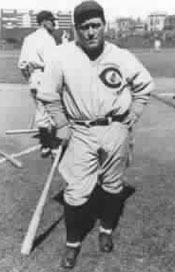
Hack Wilson; notice his
tiny feet (size 5 1/2)
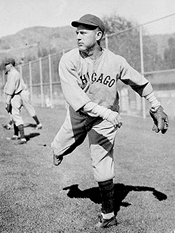
Charlie Root
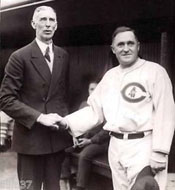
Connie Mack and Joe McCarthy at start of 1929 World Series
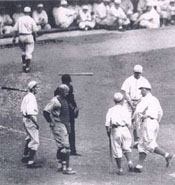
Al Simmons right after his HR
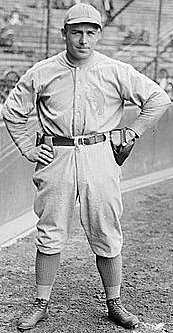
Jimmy Dykes
|
|
This
report will show how difficult it can be to ascertain the
facts even from immediate sources.
May
15, 1912: Hilltop Park – Detroit
Tigers @New York Highlanders
Ty
Cobb's bad day resulted from his behavior, not
his box score statistics. The
end result was the first player strike in baseball history. Here
are the lead paragraphs in the New York Times
article the day after the game.
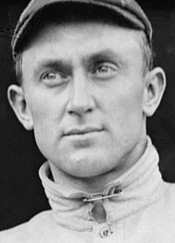
Ty Cobb

Umpire"Silk" O'Loughlin
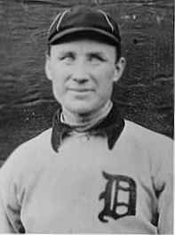
Hugh Jennings, Tiger manager
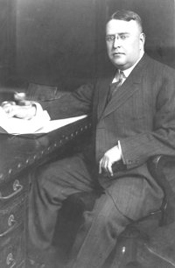
Ban Johnson, AL President
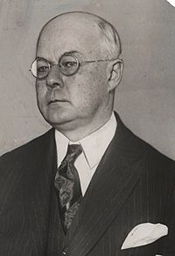
Frank Navin, Tigers Owner
|
Everything was very pleasant at the Detroit-Yankee
game on the Hilltop yesterday until Ty Cobb
johnnykilbaned a spectator right on the place where
he talks, started the claret, and stopped the flow
of profane and vulgar words. Cobb
led with a left jab and countered with a right kick
to Mr. Spectator's left Weisbach, which made his peeper
look as if some one had drawn a curtain over it. Silk
O'Loughlin, without a license from the boxing
commission, refereed the go. He gave the decision
to Cobb and then put him out of the
ring. The spectator went to a lawyer's office to make
out his will.
It all happened in the fourth inning. For three days
a group of fans have been sitting behind the Detroit
bench, enjoying an uninvited monologue for Cobb's
discomfort. What they have been saying to the Georgia
Peach has no place in a family newspaper
or even one that circulates in barbor shops only.
The conversation yesterday got as rough as No. 2 sandpaper
and Cobb hurdled into the ring. He
went right up into the stand and started to drum a
tune on the face of the vulgar person who was leading
the chorus of mining camp talk.
The scrap broke up the game for a while. Umpire
O'Loughlin and several Detroit
players subtracted Cobb from his
victim. Cobb's execution was rapid
and effective. Ty used a change of
pace and had nice control. Jab bounded off the spectator's
face like a golf ball from a rock. Cobb
was dragged back to the bench and O'Loughlin
sent him to the clubhouse. The spectator got the gate.
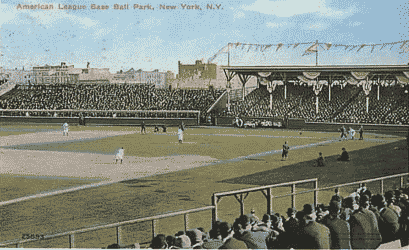
Hilltop Park, New York
The fan treated so cavalierly in the article was Claude
Lucker. (That's the spelling of the Times,
which interviewed him a few days later. The Sporting
Life, a weekly publication devoted to "base ball
and trap shooting," spelled it Lueker.
It could be that it was spelled "Lucker" but pronounced
"Lueker.") Detroit manager Hugh Jennings claimed immediately
after the incident that Cobb could take it no longer when Lucker called him
a "half-nigger." (According to Lucker,
someone else in the stands called Cobb a "coon.") Nearby fans begged Cobb to stop because Lucker had lost one hand
and three fingers of the other in a printing press accident a year earlier. Lucker said afterwards
that Cobb had to see he was disabled because
he threw up his hands to defend himself. "He pummeled
me about the face and body, and after he had knocked me
down he kicked me in the side repeatedly and then spiked
me in the left leg." After Cobb was
restrained (The Sporting Life said Highlander security guards pulled the player off the fan, not the umpire
and several players mentioned in the New York Times), Lucker demanded that Cobb be arrested. However, the park police refused.
According
to Cobb after the game, Lucker "had made it unpleasant for me on other trips to
that city, and he has continually picked me out as a target
for his abuse." He started during batting practice
and continued even after Cobb asked him
to stop.
After
the game – an 8-4 Detroit victory in the seventh game of a scheduled 21-game road
trip – the Tigers left for Philadelphia. Upon arrival, they learned that
AL President Ban Johnson, who had been
present at the game in New York, had suspended Cobb indefinitely pending further investigation. With
an off day Thursday, May 16, the Tiger players concocted a strategy to get their teammate, accused
in previous years of causing dissension but now an unexpected
source of unity, back in the lineup. They sent a telegram
to Johnson: "Feeling that Mr.
Cobb is being done an injustice by your action
in suspending him, we, the undersigned [every player on
the team except Cobb and manager Jennings],
refuse to play in another game after to-day until such
action is adjusted to our satisfaction. He was fully justified
in his action, as no one could stand such personal abuse
from any one. We want him reinstated for tomorrow's game,
May 18, or there will be no game. If the players cannot
have protection we must protect ourselves." The team
did compete on May 17, defeating the A's 6-3.
On
May 18, the Tigers,
including Cobb, took the field for pregame
practice at Shibe Park. When t he umpires ordered Ty off, the rest of the players followed him to the clubhouse,
dressed, and went back to their hotel. Expecting this
action, Jennings, to avoid a fine for
team president Frank Navin for failing
to field a team in a scheduled game, had recruited young
men from Philadelphia as replacement players. Those eight
plus two of the coaches formed the roster for the Saturday
game before 15,000 at Shibe Park.
The
pitcher was 20-year-old Allan Travers from St. Joseph's University, who dreamed of taking the
mound in the big leagues but couldn't even make his college
team. He pitched a complete game since there were no relievers.
The 26 hits and 24 earned runs are still the most ever
surrendered by one pitcher in a major league game. Somehow
the ersatz Tigers managed to plate two. The replacement players earned $50
each. The Times editorial writer the next day
labeled the Tiger players' action "a baseball strike." Sentiment
among the fans (except in Detroit), commentators, other
clubs, and certainly the owners was solidly against the
striking players.
With
Blue Laws prohibiting Sunday baseball in Philly, Johnson and Navin arrived on the scene to try
to resolve the situation. Ban announced
that each Tiger striking in support of Cobb "has
suspended himself and made himself ineligible to compete
in a game ... until he is reinstated by the National Commission."
He also decided: "The Detroit club will not appear on the field again until I am assured
that it has a set of good players who can compete with
other teams of the league. There will be no more farces
in the American League." Accordingly, the A's-Tigers game scheduled for Monday, May 20, was postponed. Johnson also imposed a fine of $50 on each striker for each game
he missed.
Lacking
public support and responding to Cobb's
pleas to forget him and take care of themselves, the players
decided to play in the scheduled game in Washington on
May 21. Finally, on May 23, Johnson set Cobb's suspension at ten days, which
would put him back on the field for the first game in Chicago on May 25. He was also assessed a $50 fine.
|
|
1958 World Series: Milwaukee Braves vs New York Yankees
Eddie Mathews contributed to the Braves' victories in the first two games of the Fall Classic in Milwaukee.
- The third-sacker was 0-3 in the opening 4-3 victory but he walked to lead off the eighth and scored the tying run. The Braves won in the tenth. However, in a portent of what was coming, Eddie struck out his first two times up and again to end the ninth with the winning run on second.
- Game 2 was Eddie's best in the seven-game series. He doubled and singled in five AB with 2 RBI and 2 runs scored. However, he threw wildly in the top of the first to help NY to a run and took a called third strike in the bottom of the iinning when the Braves scored 7 to romp 13-5.
The third game was Mathews' worst in the Series. He struck out his first three times up before walking in the eighth. He ended the third inning by fanning with runners on first and third. Don Larsen and Ryne Duren shutout Milwaukee 4-0.
The Braves took a 3-1 lead by winning Game 4 3-0 behind Warren Spahn's two-hitter. Mathews was called out on strikes in the first, popped out in the fourth, and popped out on a bunt attempt in the sixth. He did double in a run in the eighth. Bob Turley gave the Yanks what they desperately needed in Game 5, a 7-0 shutout. Mathews singled in four AB with another K.
Back in Milwaukee, Eddie went 0-5 in Game 6, a 4-3 Yankee win in ten innings. Mathews was called out in the first with a runner on second, grounded out in the third, popped out in the fifth with a runner on third and one out, fouled out to open the eighth, and took strike three in the tenth with one out and a runner on first. In Game 7, Mathews was walked intentionally twice, grounded out in the sixth, and walked to start the ninth. NY won 6-2 to become the second team (at that time) to take the Series after falling behind 3-1 (1925 Pirates the other).
Mathews' 11 strikeouts set a Fall Classic record (since equalled by Wayne Garrett in '73 and surpassed in only six games by Willie Wilson in 1980). However, some of his mates shared the blame for the team's downfall. Compare the regular season and Series numbers for the middle of the Brave order. Amazingly, the Yankee staff held the Power Row homerless in seven games. In fact, Milwaukee hit only two HRs (CF Bill Bruton and C Del Crandall).
| 1958 Braves |
Regular Season |
World Series |
| Player |
BA |
HR |
RBI |
BA |
HR |
RBI |
| Eddie Mathews 3B |
.251 |
31 |
77 |
.160 |
0 |
3 |
| Hank Aaron RF |
.326 |
30 |
95 |
.333 |
0 |
2 |
| Wes Covington LF |
.330 |
24 |
74 |
.269 |
0 |
4 |
| Joe Adcock/Frank Torre 1B |
.293 |
25 |
109 |
.233 |
0 |
1 |
|
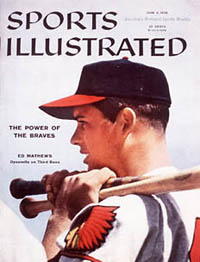
Eddie Mathews
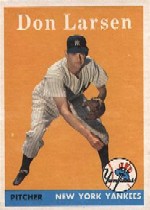
Don Larsen
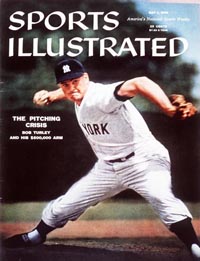
Bob Turley
|
|
One of the longest games in history was played on May 31, 1964. The San Francisco Giants defeated the New York Mets at brand new Shea Stadium 8-6 in a 23-inning, seven hour and 23 minute marathon. Furthermore, the contest was the second game of a doubleheader! The Giants won the 2:29 opener 5-3 behind a complete game from Juan Marichal. The nightcap and the entire doubleheader set a record for the longest game, by time. Both marks have since been broken. Chicago 7 Milwaukee 6 in 1984 lasted 25 innings and 8:06. And the Kansas City Athletics-Detroit Tigers doubleheader in 1967 lasted 9:05 with the second game lasting 19 innings.
The Mets rallied to erase a 6-1 deficit in the nightcap with 2 in the sixth and 3 in the seventh. The game then remained scoreless until the 23rd, when the Giants plated 2 for the victory.
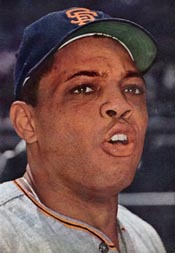
Willie Mays
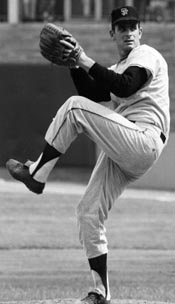
Gaylord Perry
|
Often lengthy contests wreak havoc on the batting averages of players who play the entire game. Such was the case for Willie Mays. In the opener, Mays went 1-3 to lower his average to .382. Then he played all 23 innings of the nightcap. Here's what Willie did at the plate.
- 1st: Single to drive in Jesus Alou.
- 3rd: Forceout; scores on C Tom Haller's single.
- 4th: Strikeout.
- 7th: Fly out.
- 10th: Groundout.
- 11th: Groundout with runners on 1st and 3rd.
- 14th: Walked, then was erased on the line drive triple play (6-3) off the bat of Orlando Cepeda.
- 16th: Groundout.
- 19th: Strikeout.
- 22nd: Foul out.
- 23rd: Ends inning with groundout with insurance run on 3rd.
So Willie came to bat 10 times and recorded only one hit to drop his average to .364. (Willie ended the season at .304.) He scored one run and drove in another. One interesting facet of the game is that Willie spent the 10th through the 12th innings at SS before returning to CF. He had no chances in his three innings on the IF.
Another future Hall of Famer, Gaylord Perry, had a great day. He pitched shutout ball from the 13th through the 22nd. Del Crandall pinch hit for him and drove in one of the two runs that finally broke the deadlock in the top of the 23rd. Bob Hendley pitched a scoreless 23rd to save Perry's win. Galen Cisco pitched a "complete game" for the Metsalso, hurling the last nine innings and taking the loss.
The attendance for the DH was 57,037, the largest crowd in the majors up to that point that year. However, less than 10,000 remained when the second game ended at 11:25 pm.
How did the two teams fare the next game after the exhausting DH?
- The Giants fortunately had the next day off. Then they lost at Pittsburgh on Tuesday, 3-1.
- Casey Stengel's Mets also had the next day off before hosting their fellow three-year expansion team, the Houston Astros. New York won 7-4.
|
|
|
